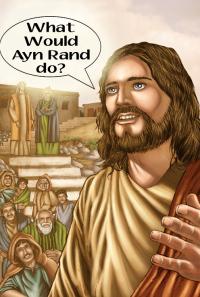
Ayn Rand
By Alan Bean
How did Ayn Rand become an icon of the Religious Right? It’s not what she would have wanted, Lord knows, and yet, there it is.
Ayn Rand despised Jesus, and would have despised him all the more if she had understood him better. In a 1946 letter to a fan named Sylvia Austin, Rand identified a fundamental “contradiction” in Jesus teaching. She had to give the man from Galilee his props:
Jesus was one of the first great teachers to proclaim the basic principle of individualism — the inviolate sanctity of man’s soul, and the salvation of one’s soul as one’s first concern and highest goal; this means — one’s ego and the integrity of one’s ego.
The single-minded pursuit of personal salvation was something Ayn Rand could admire even if she didn’t believe in survival beyond the grave. But there was a problem.
When it came to the next question, a code of ethics to observe for the salvation of one’s soul — (this means: what must one do in actual practice in order to save one’s soul?) — Jesus (or perhaps His interpreters) gave men a code of altruism, that is, a code which told them that in order to save one’s soul, one must love or help or live for others. This means, the subordination of one’s soul (or ego) to the wishes, desires or needs of others, which means the subordination of one’s soul to the souls of others.
 Rand was open to the possibility that Jesus may have been misrepresented by his interpreters, and she is right. But Rand, not surprisingly, got hold of the wrong end of the stick. Jesus came, as John’s Gospel declares, “that the world [not isolated individuals] might be saved”. Jesus lived as if the Kingdom of God was a present reality and called his disciples to live accordingly. We live for others because that’s the kingdom way–it has nothing to do with going to heaven when we die.
Rand was open to the possibility that Jesus may have been misrepresented by his interpreters, and she is right. But Rand, not surprisingly, got hold of the wrong end of the stick. Jesus came, as John’s Gospel declares, “that the world [not isolated individuals] might be saved”. Jesus lived as if the Kingdom of God was a present reality and called his disciples to live accordingly. We live for others because that’s the kingdom way–it has nothing to do with going to heaven when we die.
The incalculable chasm fixed between Jesus and Ayn Rand comes into focus when we consider the Parable of the Prodigal Son. In Rand’s secular religion, the Father in the story would have commanded his elder son to release the hounds on the returning prodigal, and when the dogs had reduced the poor wretch to a pile of bloody rags, the estimable father and his worthy son would slaughter the fatted calf in celebration.
The contemporary distinction between “makers” and “takers” captures the cruel essence of Rand’s philosophy.
So back to our question. How could zealous followers of Jesus like Paul Ryan, Ted Cruz, Rand Paul, Clarence Thomas, Ron Johnson, and Ronald Reagan fail to notice the anti-Christian logic at work in their mentor’s philosophy?
The mystery deepens in light of the fact that Rand’s moral logic led to some radically “liberal” conclusions. As a refugee from communist Eastern Europe, she was a champion of open borders. The makers of the world would welcome the foreign competition, she argued, while the takers who succumbed to the onslaught didn’t deserve to keep their jobs in the first place.
Rand also applied her Nietzschean logic to the issue of abortion. When the rights of a blob of helpless protoplasm are compared to the rights of a creative, ambitious mother out to make her mark in the world, she said, it’s a no-brainer. It is the mother’s right, as the stronger and more vital competitor, to do with her own body what she wishes.
It isn’t as if no one on the religious or political Right has noted the contradiction between God and Randian mammon. William F. Buckley, the founder of American conservatism, dismissed Rand as a dangerous crank with a second-rate intellect. More to the point, Charles Colson, founder of the Prison Fellowship ministry, begged his co-religionists to abandon their love affair with their anti-Christian guru. At first, prominent conservatives like Glenn Beck were open to Colson’s pleading. But with the reformed hatchet-man safely in his grave, Beck got over it and so, it appears, has practically everyone else on the right.
So, what is it about Ayn Rand’s heartless rationalism that appeals to so many religious and political conservatives?
As near as I can figure, it’s all about holding together an American version of Christendom. For folks like Beck and Cruz, America is a land in which the kingdoms of this world have become the kingdom of our God and of his Christ. At least, that’s the way it was before the liberals took over, and that’s the way it can be again if we return to our first love.
Christendom is an ancient idea, stretching back, at the very least, to the time of the Emperor Constantine (d. 337 CE). During the glory days of the Holy Roman Empire, citizenship and Christian identity became largely synonymous, an understanding that survived the Protestant Reformation.
Soren Kierkegaard (d. 1855) penned his “Attack on Christendom,” reasoning that if every child born in his native Denmark was a baptized Christian, the designation had lost all meaning. If everyone was a Christian, no one was a Christian and Christendom was exposed as
a criminal offense against Christianity, prolonged through centuries, perpetrated by millions (more or less guiltily), whereby they have cunningly, under the guise of perfecting Christianity, sought little by little to cheat God out of Christianity, and have succeeded in making Christianity exactly the opposite of what it is in the New Testament.
Christendom demands certain accommodations. Rulers within the Holy Roman Empire generally lived by the ruthless dictates of Niccolo Machiavelli rather than Jesus of Nazareth, and yet they had to be considered “Christian Monarchs”. To make this work, the bar of expectation had to be lowered on a regular basis. Eventually, the bar rested on the ground.
Kierkegaard’s critique of Christendom is particularly applicable to the American version of the concept. Here we have a nation that decimated its native population, enslaved and disenfranchised millions of people, and slaughtered half a million men in a failed attempt at redemption.
At yet, America has also been a land of opportunity and entrepreneurial dynamism, a nation with an ever-expanding frontier where brave, dedicated souls could shape their own destinies with sweat, grit and intelligence.
Unfortunately, the dark version of American history and its glowing alternative are inseparable. Millions of people have subsisted in misery and degradation so others could march to glory. It ain’t pretty, but there it is.
The Religious Right has hitched its star to the inspiring fantasy of American Christendom and, as always, a few minor accommodations have been called for. Political domination means membership in a coalition of convenience extensive enough to win elections, and that means dancin’ with them what brung ya. Because America reflects the warring spirits of Jesus and Ayn Rand a shotgun wedding was hastily arranged.
Ayn Rand was right about two things. America was founded on the virtue of naked self-interest. Secondly, Christian virtues like self-denial, compassion and altruism really do run counter to human nature. We can sacrifice for deserving members of our own tribe, but if it comes to loving our enemies or making do so that the undeserving can stay alive, we push back, we resist.
Fortunately, Jesus has been dead and gone for two thousand years so Christians are free to ignore the inconvenient aspects of his teaching without consequence. In fact, we are free to embrace the feverish rantings of a philosophical hack if it helps us bridge the chasm ‘twixt Jesus and the American Way.
If Ayn Rand were still alive, she would denounce the Religious Right and the Secular Left with equal and opposite gusto. But Ayn Rand is not alive. Like Jesus of Nazareth she is dead and gone, leaving Ted Cruz and his ideological friends free, for the moment at least, to join together what God Almighty hath cloven asunder.
